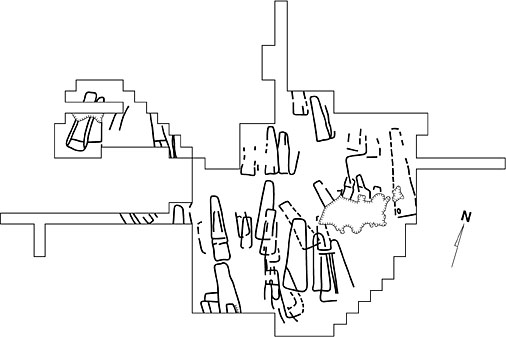

 | Page 225 |  |
of settlements of cultures of southern origin in the Brześć Kujawski region from 1934 to 1939. The excavations in Brześć Kujawski were carried out later by Maria Chmielewski and Waldemar Chmielewski in the 1950s and by Ryszard Grygiel and Peter I. Bogucki in the 1970s and 1980s.

Plan of Brześć Kujawski
(1784–1856)
English geologist, Anglican priest, and professor of mineralogy at Oxford University, William Buckland believed that universal catastrophes had wiped out species and that God had created new ones to take their place. Buckland studied the chronology and stratigraphy of caves, and along with the French geologist Georges Cuvier explored the association between fossil humans and the remains of extinct animals. Evidence of the increasing complexity of plant and animal life in successive geological strata was viewed by Buckland as the result of separate and individual acts of creation and not as a developmental sequence. He believed that God and not the natural world was responsible for evolution.
In 1823 Buckland published his Reliquiae diluvianae, listing all the then-known finds of fossil human and faunal remains. He concluded that human bones were not as old as the animal bones with which they were found because they were intrusions, the result of geological processes, faults, or tectonic movements. For over twenty years his views dominated the scientific establishment, until those of geologist charles lyell, and the antiquaries and archaeologists who had burgeoning evidence of human antiquity, superseded them.
See also
Boucher de Perthes, J.; Britain, Prehistoric; Prestwich, J.
For objective historical reasons, the beginning of Bulgarian archaeology has been traced back no earlier than the last decades of the nineteenth century. During the sixteenth to the nineteenth centuries, many European travelers who passed through the Ottoman Empire described various antiquities in Bulgarian lands. Thus, in 1868, the French scholar A. Dumont traveled in southern Bulgaria, then under Ottoman rule, and later published his reports (Dumont 1892). However, it would be some years after Bulgaria was emancipated in 1878 before the pioneers of Bulgarian archaeology started excavating sites and studying diverse ancient and mediaeval artifacts. The pioneers were usually Bulgarian enthusiasts whose experience in archaeology was acquired in the course of their work; therefore, it was the Czech scholars C. Jirećek, V. Dobrusky, and H. and K. Škorpil who initiated real archaeology in Bulgaria and published the first archaeological studies (Dobrusky 1896, 1897; Jirećek 1877, 1881; H. Škorpil 1894; H. Škorpil and K. Škorpil 1896).
 |  |